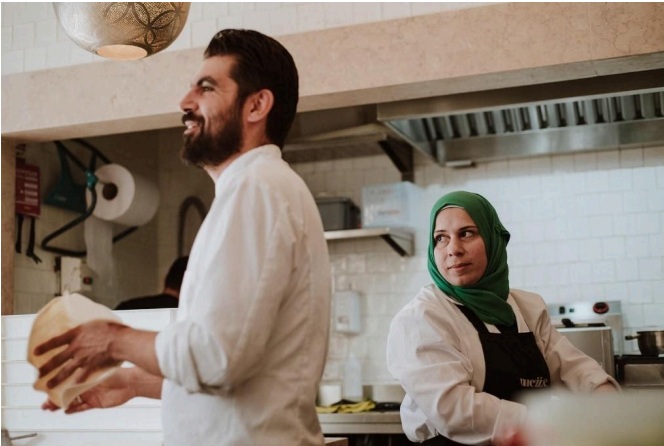Best practice on EDI: Associação Pão a Pão, Portugal
Associação Pão a Pão (Bread by Bread) is an NGO that uses food to provide cultural connections and support the integration of refugees and migrants in Portugal.The organisation operates a restaurant and offers catering services for events and workshops.
Context
Pão a Pão supports the integration of refugees and migrants into local communities by increasing their employability through its Mezze Escola training course. Pão a Pão’s mission is threefold: to offer training and employment opportunities, eliminate cultural barriers, and foster connections between newcomers and host communities. Pão a Pão was founded in 2017 after a Syrian student living in Lisbon was asked what she missed most about home. Her response, “Bread! Syrian bread!” highlighted the importance of food in reflecting one’s origins and shaping identity. Similarly, this initiative recognises that food also serves as a powerful bridge, connecting people from diverse backgrounds to share meaningful moments and experiences. The organisation currently employs 20 people, with 5 working at the association and 15 at the restaurant.
Implementation
This project began in the Arabic restaurant, Mezze, located in Lisbon, where newcomers from the Middle East were offered training and jobs. Pão a Pão developed a training programme for refugees and migrants that equips them with the skills needed to enter the restaurant industry. The course also educates them on their rights to education, housing, fairly paid work, social and fiscal responsibilities, as well as the importance of mental well-being. This ongoing course was developed in collaboration with the Lisbon School of Hospitality and Tourism and the Calouste Gulbenkian Foundation’s Cidadãos Activ@s Programme. The training at Mezze Escola lasts six months, combining theoretical and practical components. The theoretical portion is delivered at the school, while the practical training takes place both at the Mezze restaurant and in partner restaurants. Upon completion, Pão a Pão connects migrants and employers to facilitate professional internships and job placements.
Enabling Factors
An enabling factor is that Pão a Pão has obtained certification for its training course, enhancing its credibility and increasing its impact within the industry. Another enabler is the continuous financial support offered by the Calouste Gulbenkian Foundation, which has helped ensure the organisation’s development and success.
Barriers
Pão a Pão faces barriers commonly associated with assisting migrants and refugees when integrating into the programme, including managing numerous institutions and the
constraints these bodies impose. In other words, ensuring the success of the training program requires additional efforts, such as addressing legal issues, assisting immigrants with housing, challenging societal perceptions, and supporting physical and mental health.
Impact on the Organisation
The training course has enhanced employability and facilitated the integration of the migrant community into the Portuguese workforce. Pão a Pão has helped empower this marginalised group by ensuring fair access to the labour market as well as greater social inclusion. In addition, the organisation has also received recognition for its initiatives supporting refugees, including the Social Entrepreneurship Award from the PSA – Peugeot Citroen Foundation and the Julia Taft Grant.
Quotes
‘We believe that there is no “them” or “us,” only “all of us”.’
‘The table provides integration and inclusion. The table unites, the bread unites.’
‘We know the power of food to create bridges, break down prejudices, bring people together and include them.’
‘What we bring to the table are not only tasty dishes prepared by hands full of stories.’
‘We also bring inclusion, solidarity, and tolerance.’
Lessons Learned
Pão a Pão Association adopts a holistic approach to migration, recognising that successful integration requires more than just employment and education. By addressing key factors such as housing and mental health, the organisation provides refugees and migrants with the essential support to start a new life in Portugal.
Future Plans
Following three successful editions in Lisbon, the course has expanded to Porto, where it is now being taught at the Porto School of Hospitality and Tourism. Pão a Pão will also continue to raise awareness of the issues migrants and refugees face. The training programme will proceed in Lisbon, while the restaurant will remain a key provider of training and employment opportunities for refugees and migrants.
Links with UN Sustainable Development Goals
By offering training opportunities in practical settings of Portugal’s hospitality sector, this initiative supports lifelong learning and personal development for individuals from diverse backgrounds. Pão a Pão helps refugees and migrants acquire skills to enhance their employability and assimilate into the workforce. This initiative reduces inequalities by improving access to education, training, and employment opportunities for refugees and migrants.
Read the full EDI report here.





No Comments